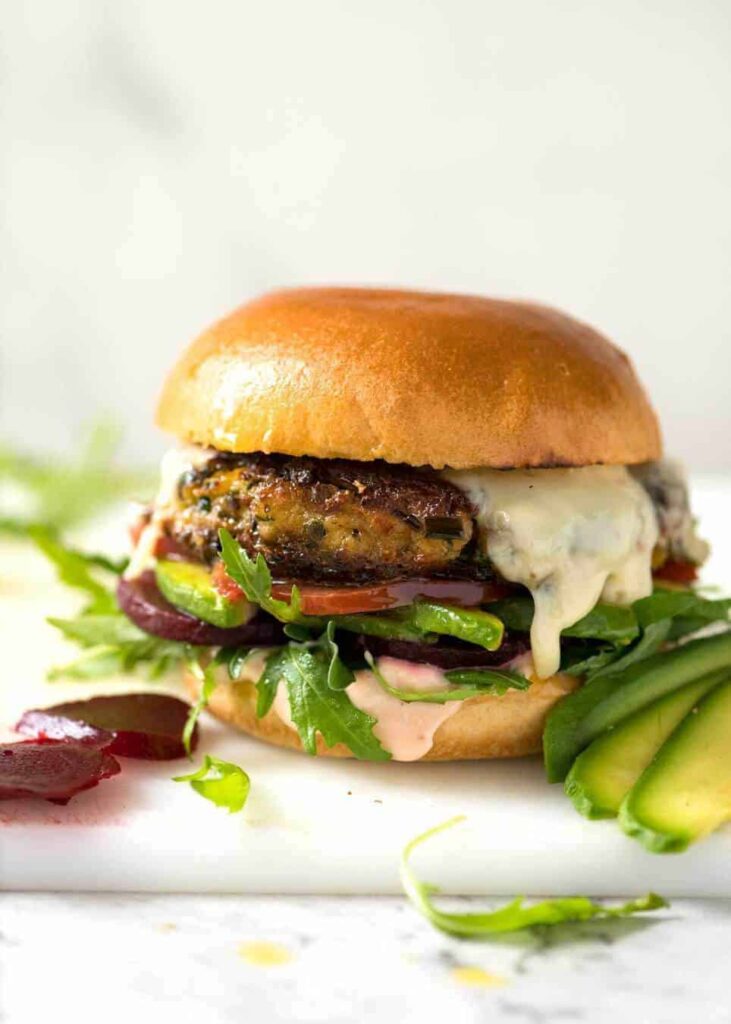Veggie burgers have become a popular choice for those seeking a plant-based alternative to traditional meat burgers. Packed with vegetables, legumes, and grains, they offer a flavorful and satisfying option for vegans, vegetarians, and meat-eaters alike. In this article, we’ll explore the world of veggie burgers, including a detailed recipe, nutritional facts, and serving suggestions.

Benefits of Veggie Burgers
Before we delve into the recipe, let’s discuss the numerous benefits of incorporating veggie burgers into your diet.
Plant-Powered Protein
- Veggie burgers are rich in protein thanks to ingredients like beans, lentils, tofu, and quinoa. Protein is essential for muscle repair and growth, making veggie burgers a great post-workout meal option.
Fiber-Rich
- With an abundance of vegetables and whole grains, veggie burgers are high in fiber. Fiber aids in digestion, promotes satiety, and helps regulate blood sugar levels, making veggie burgers a satisfying and nourishing choice.
Nutrient-Dense
- Veggie burgers are packed with vitamins, minerals, and antioxidants from a variety of plant-based ingredients. These nutrients support overall health and well-being, contributing to a balanced diet.
Ingredients for Veggie Burgers
To make delicious and nutritious veggie burgers, you’ll need the following ingredients:
- Cooked beans (such as black beans, chickpeas, or kidney beans)
- Cooked grains (such as quinoa, brown rice, or bulgur)
- Chopped vegetables (such as onions, bell peppers, mushrooms, or spinach)
- Binding agents (such as flaxseed meal, breadcrumbs, or oats)
- Flavorings and seasonings (such as garlic, herbs, spices, and nutritional yeast)
- Optional toppings and condiments (such as lettuce, tomato, avocado, and vegan mayo)
Step-by-Step Recipe
Now, let’s walk through the process of making flavorful veggie burgers from scratch:
1. Prepare the Ingredients
- Drain and rinse the cooked beans, if using canned beans.
- Cook the grains according to package instructions and allow them to cool.
- Chop the vegetables into small, uniform pieces to ensure even cooking and texture.
2. Mash and Mix
- In a large mixing bowl, mash the cooked beans using a fork or potato masher until they reach your desired consistency.
- Add the cooked grains, chopped vegetables, binding agents, and seasonings to the bowl.
- Mix everything together until well combined, using your hands or a spoon to ensure even distribution of ingredients.
3. Form Patties
- Divide the mixture into equal portions and shape them into patties of your desired size and thickness.
- Place the patties on a lined baking sheet or plate and refrigerate them for at least 30 minutes to help them firm up.
4. Cook the Patties
- Heat a non-stick skillet or grill pan over medium heat and lightly coat it with oil or cooking spray.
- Cook the veggie burger patties for 4-5 minutes on each side, or until golden brown and heated through.
- Alternatively, you can bake the patties in a preheated oven at 375°F (190°C) for 20-25 minutes, flipping halfway through.
5. Serve and Enjoy
- Once cooked, serve the veggie burgers on whole grain buns or lettuce wraps.
- Top with your favorite toppings and condiments, such as lettuce, tomato, avocado, onions, pickles, or vegan cheese.
- Enjoy your delicious and nutritious homemade veggie burgers!
Nutritional Facts of Veggie Burgers
Veggie burgers offer a wide array of nutrients, including protein, fiber, vitamins, and minerals. Here’s a breakdown of their nutritional profile:
- Calories: Approximately 150-200 per patty
- Protein: 8-12 grams
- Fiber: 5-8 grams
- Healthy fats from plant-based sources
- Vitamins and minerals: Iron, calcium, potassium, and more
Serving Suggestions
Veggie burgers are incredibly versatile and can be enjoyed in various ways. Here are some serving suggestions to try:
- Serve the veggie burgers with a side of oven-baked sweet potato fries or a mixed green salad for a balanced meal.
- Wrap the patties in lettuce leaves or whole grain tortillas for a low-carb option.
- Top the burgers with homemade salsa, guacamole, or tahini sauce for added flavor and creaminess.
- Pair the burgers with your favorite beverage, such as iced tea, lemonade, or a refreshing fruit smoothie.
Conclusion
In conclusion, veggie burgers offer a delicious, nutritious, and sustainable alternative to traditional meat burgers. With their plant-powered ingredients and endless flavor possibilities, they’re sure to satisfy your taste buds and nourish your body. Whether enjoyed for lunch, dinner, or a weekend barbecue, veggie burgers are a wholesome choice for any occasion.
FAQs
- Can I freeze homemade veggie burger patties?
- Yes, you can freeze veggie burger patties for later use. Simply wrap them individually in plastic wrap or parchment paper and store them in an airtight container or freezer bag for up to 3 months.
- Are veggie burgers suitable for a vegan or vegetarian diet?
- Absolutely! Veggie burgers are entirely plant-based and can be enjoyed by vegans, vegetarians, and omnivores alike.
- Can I customize the ingredients in veggie burgers?
- Of course! Feel free to experiment with different beans, grains, vegetables, and seasonings to create your perfect veggie burger recipe.
- What can I use as a binding agent in veggie burgers?
- Common binding agents include flaxseed meal, breadcrumbs, oats, or mashed sweet potato. These ingredients help hold the patties together and prevent them from falling apart during cooking.
- Are veggie burgers healthier than traditional meat burgers?
- Veggie burgers tend to be lower in saturated fat and cholesterol compared to traditional meat burgers, making them a healthier option for heart health. Additionally, they’re higher in fiber and contain a variety of vitamins and minerals from plant-based ingredients.
Try making your own homemade veggie burgers and experience the deliciousness and nutritional benefits firsthand!
